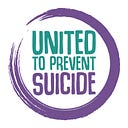Linda’s Story
Hello everyone! I’m Linda and I’ve taken a bit of time today to tell you my story. Suicide affects so many of us, but hopefully opening up here can help some people that are currently feeling what I have felt.

I have tried to complete suicide on 3 separate occasions — the first 2 attempts were cries for help, but the 3rd was a definite attempt to end my life and stop the pain in my head that no one can imagine unless they’ve experienced themselves and not something I can describe.
It was so bad that I remember being on my knees pleading with my mother in law to take me to Dignitas in Switzerland to end my life. It was that bad!! I took my last and final overdose in August 2017.
My anxiety was so extreme and I was sweating so much that I thought I had a virus and was infecting everyone. A lot of different thoughts are going through the mind of someone who wants to end their life.
It’s important to know that whatever is going on in your head needs to be talked about.
I had convinced myself that my youngest daughter had meningitis — she had a rash and a sore head, and when I put the light on she turned away from the light and moaned. So, early that morning, I took an overdose.
My youngest daughter thought I had food poisoning, but when my oldest daughter was clearing up the sick, she found one single tablet and twigged. The paramedics were 40 minutes reviving me, so I believe that if that amount of tablets didn’t kill me, nothing would.
I now also believe that I’m here for a reason.
I told no one about my suicide plans and scoured Fife for places where I could end my life, but didn’t want anyone to have to go through the shock of finding me. I also don’t remember anyone asking me about why I attempted to take my life when I was in psychiatric hospital.
There needs to be early intervention as once someone reaches suicidal stage, their mental health has deteriorated to a point of possible no return. I can only tell you about my speaking out now — not sure if it helps me, but I’m led to believe it helps others.
Talking is imperative, as the biggest challenge you have is with what is going on in your head and the conversations that they are holding with each other. We all think we’re “normal” and no one knows what goes on in anyone else’s minds, so this has to be done very sensitively and be non judgemental.
The person who is listening needs to be interested, engaged and empathetic. And be the same person. Repeating your “story” is harrowing enough without having to repeat yourself.
The benefits of talking when you’re suicidal depends on who you’re talking to and if they understand. I suppose you have to feel that you’re not alone and that there is hope, a glimmer of light at the end of the long tunnel and a future
I’m still not sure if speaking to my GP when I was supposed to would have helped which is why I am advocating it now. So yes, I suppose my perspective has changed.
My mental health is much better now, but yes, I am very open and confident about talking about my suicide attempts now. So much so, that I became a Samaritan and now run my own mental health group for ladies.
I think we don’t talk about suicide because it has been such a taboo word. We’re still trying to get people to talk about their mental health, but suicide is on a different level. I remember the first time I asked someone on a Samaritan call if they were thinking of suicide — it was such a hard word to say.
Even now, I use the term ‘ending your life’ as ‘committing suicide’ relates to when it was an offence and that the person is a criminal and doing something so wrong.
Talking about mental health should become “normal” but also knowing who to contact should be easily accessible. Even having one centralised number (like 111 or 999) and then having a triage, signposting system.
The NHS mental health services are stretched to breaking point as it is. This is where support groups like Linda’s Ladies are helping. People who have mental health conditions “get” each other where other “normal” people don’t.
I also think people with mental health conditions shouldn’t be labelled, as we all have mental health and being labelled can mean that someone could use their label as a “badge of honour”. We’re all our own version of normal.
If someone is struggling, I’d tell them to go find someone to talk to, tell them you’re struggling and that you need professional help. Be brutally honest with the professional as they can’t help you unless they know all the facts no matter how odd you think they are.
And yes, there is always hope! I know how wild that sounds, but it was real in my head.
I’m most thankful that my daughter found that one tiny tablet…
The following services offer confidential support from trained staff and volunteers. You can talk about anything that is troubling you, no matter how difficult:
- Call 116 123 to talk to Samaritans, or email jo@samaritans.org
- Call 111 to talk to NHS 24’s mental health hub
- Call 0800 83 85 87 to talk to Breathing Space. The service is open 24 hours at weekends (6pm Friday — 6am Monday) and 6pm to 2am on weekdays (Monday — Thursday).
